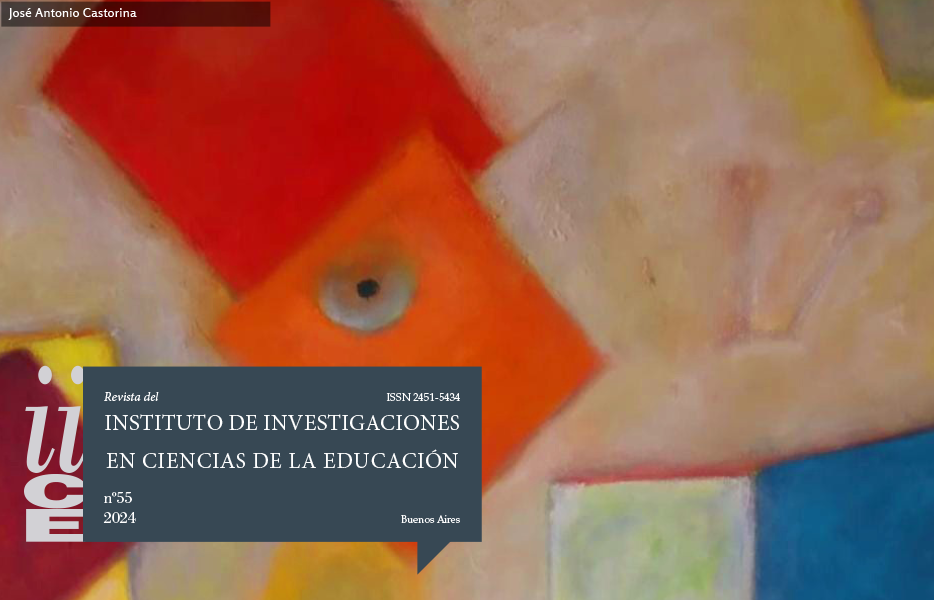Education and the digital vulnerabilization of democracy
Abstract
This article studies the dynamics of vulnerability in democracy in the context of a new order, the algorithmic digital order, and seeks to find out how education can help mitigate this phenomenon. The article, presenting new conceptualizations and using interpretative analysis to achieve its purposes, characterizes the algorithmic digital order in which the most advanced societies in digitalization and algorithmization are located and, within this framework, develops an inquiry into the possible role of social media platforms in making structural elements of democracy vulnerable, based on recent research on the matter. This investigation attests that digital social networks effectively threaten democracy in some dimensions, leading us to ask whether this is an inevitability or whether we can respond to it by resorting to education, considering primarily the education of young age groups who attend schools. The article's line of argument concludes in this regard that actually existing democracies, consolidated and emerging, are not condemned to wither under the pressure of this vulnerability and that education, through stimulation of democratic care, can help contain this phenomenon.Downloads
References
Barbera, P. (2020). Social media, echo chambers, and political polarization. Em Persily, N. e Tucker, J. (eds.). Social media and democracy. The state of the field, prospects for reform. Cambridge: Cambridge University Press.
Brown, M.; Bisbee, J.; Lai, A. e Bonneau, R. (2022). Echo chambers, rabbit holes, and algorithmic bias: how YouTube recommends content to real users. Brookings Institution, (s/n): 1-13. Disponível em: https://ssrn.com/abstract=4114905.
Burgaya, J. (2021). La manada digital. Feudalismo hipertecnológico en una democracia sin ciudadanos. Barcelona: El Viejo Topo.
Chen, A.; Nyhan, B.; Reifler, J. e Robertson, R. (2023). Subscriptions and external links help drive resentful users to alternative and extremist YouTube channels. Science Advances, (9): 1-13. Disponível em: https://www.science.org/doi/10.1126/sciadv.add8080.
Chin, J. e Lin, L. (2023). Estado de vigilância. Lisboa: Relógio d’Água.
Cohen, D. (2022). Homo numericus. París: Albin Michel.
Comissão Europeia. (2019). Eurobarómetro 89.2: Acessibilidade e confiança nas notícias. Bruxelas: Comissão Europeia. Disponível em: https://www.europarl.europa.eu/
Comissão Europeia. (2020). Plano de ação para a educação digital 2021-2027. Reconfigurar a educação e a formação para a era digital. Bruxelas: Comissão Europeia. Disponível em: https://education.ec.europa.eu/pt-pt/focus-topics/digital-education/...
Diamond, L. (2015). Facing up to the democratic recession. Journal of Democracy, 26 (1): 141-155.
Foa, R. e Mounk, Y. (2017). The signs of deconsolidation. Journal of Democracy, 28 (1): 5-15.
Foucault, M. (1982). Le sujet et le pouvoir. Dits et Écrits, T. III. París: Gallimard.
Foucault, M. (2008). Le gouvernement de soi et des autres. París, Gallimard.
Guess, A. r Lyons, B. (2020). Misinformation, disinformation, and online propaganda. Em Persily, N. e Tucker, J. (eds.). Social media and democracy. The state of the field, prospects for reform. Cambridge: Cambridge University Press.
Habermas, J. (2023). Espace public et démocratie déliberative. Un tournant. París: Gallimard.
Haidt, J. (2022). Por qué las redes sociales debilitan la democracia. Revista Letras Llibres, (s/n), 14-18. Disponível em: dosier-haidt-esp.pdf (letraslibres.com).
Han, B.-C. (2016). No enxame. Reflexões sobre o digital. Lisboa: Relógio D’Água.
Han, B.-C. (2022). Não-coisas. Transformações do mundo em que vivemos. Lisboa: Relógio D’Água.
Hertz, N. (2021). O século da solidão. Como restaurar as ligações humanas. Lisboa: Círculo de Leitores.
International IDEA. (2022). The global state of democracy report 2022. Forging social contracts in a time of discontent. Strömsborg: International Institute for Democracy and Electoral Assistance. Disponível em: https://www.idea.int/democracytracker/gsod-report-2022.
Jarry-Lacombe, B.; Bergère, J.-M.; Euvé, F. e Tardieu, H. (2022). Pour un numérique au service du bien commun. París: Odile Jacob.
Kissinger, H.; Schmidt, E. e Huttenlocher, D. (2021). A era da inteligência artificial. Lisboa: D. Quixote.
Lassalle, J. (2019). Ciberleviatán. El colapso de la democracia liberal frente a la revolución digital. Barcelona: Arpa.
Martins, C. e Pereira, E. (2023). A desinformação. Contexto europeu e nacional. Coimbra: Almedina.
Nyhan, B.; Settle, J.; Thorson, E. e Wojcieszak, M. (2023). Like-minded sources on Facebook are prevalent but not polarizing. Nature, 620: 137-144. Disponível em: https://doi.org/10.1038/s41586-023-06297-w.
Oliveira, A. (2023). Ciência, tecnologia e sociedade. Lisboa: Guerra e Paz.
Persily, N. e Tucker, J. (eds.). (2020). Social media and democracy. The state of the field, prospects for reform. Cambridge: Cambridge University Press.
Plá, M. (2022). Desconexión. El gran reemplazo digital. Valencia: Barlin Libros.
Ramonet, I. (2015). El imperio de la vigilancia. Madrid: Clave Intelectual.
Sadin, É. (2018). L’intelligence artificielle ou lenjeu du siècle. París: L’Échappée.
Shaw, A. (2023). Social media, extremism, and radicalization. Science Advances, (9). 1-2. Disponível em: https://www.science.org/doi/10.1126/sciadv.adk2031.
Véliz, C. (2021). Datos, vigilancia y libertad en la era digital. Barcelona, Debate.
Vestager, M. (2023). Derrubar os muros das grandes empresas de tecnologia. A Revista do Expresso, (2630): 16-17.
Vicente, P. (2023). Os algoritmos e nós. Lisboa: Fundação Francisco Manuel dos Santos.
Zuboff, S. (2020). A era do capitalismo da vigilância. Lisboa: Relógio d’Água.











